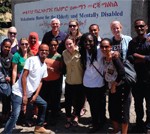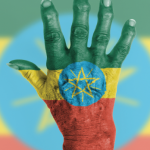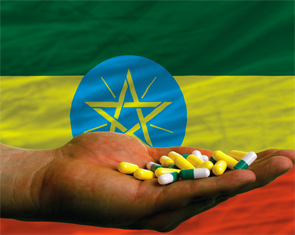
vepar5/shutterstock.com
The first month of my last year of rheumatology fellowship began in Addis Ababa, Ethiopia, at Black Lion Hospital, a tertiary university medical center, where I [Dr. Mary Abraham] started an Emory-sponsored global health rotation. Although a very different beginning to my fellowship year, my experiences at Black Lion reminded me of my passion to help people and to solve complex multisystem problems.
My rheumatology attending [Dr. Frehyiwot Ayele] and I embarked on the journey to Ethiopia together to learn management of rheumatology patients in a low-resource setting and to be exposed to pathology often not seen in the U.S.
Black Lion did not have trained rheumatologists, and although there was a rheumatology clinic, it was resident run and occurred once a week. These facts certainly posed their own challenges. Identifying rheumatology needs in Ethiopia and designing a curriculum that would inculcate residents and medical students in management of rheumatic diseases and at the same time inspire them to become rheumatologists were no small goals.
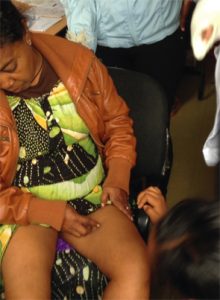
A patient presents with lupus-related purpura during the nephrology clinic at Black Lion.
My attending was Ethiopian herself, and Black Lion Hospital is where she did her internal medicine residency training before coming to the U.S., which made it easier for us to navigate the Ethiopian health system. We began our work with a sense of confidence in the changes we could make.
In the Clinic
We began our first day by making our way to the internal medicine office, where the program director warmly welcomed us. Together we identified my goals and educational needs and created a curriculum to increase awareness, as well as knowledge of, rheumatologic conditions and their management among residents and medical students.
I came to understand the importance of coffee in Ethiopian culture and its central role in building trust and friendship; it is said that coffee was discovered in Ethiopia. While drinking coffee with internal medicine and subspecialty faculty on that first day, we received sound advice and insight into the medical training process at Black Lion. For my attending, it was a time to reconnect with old friends and colleagues with whom she had trained and thereby understand the best approach to creating more exposure to rheumatology.
Opportunely, my arrival in Black Lion Hospital coincided with the start of a two-week rheumatology module for the internal medicine residents. My attending and I had the opportunity to deliver lectures on rheumatoid arthritis (RA), gout and systemic lupus erythematosus (SLE) in a small-group setting, which enabled us to assess resident knowledge, as well as gaps. During this time, internal medicine residents gave lectures on such topics as SLE and its pathogenesis, lupus nephritis (LN), antiphospholipid syndrome and RA. It was clear they were well versed in clinical knowledge.

This patient with SLE presented to the Black Lion Nephrology Clinic with an old discoid rash.
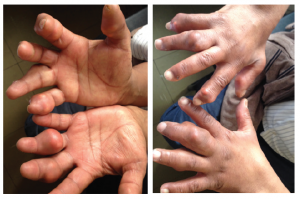
This patient in the Black Lion rheumatology clinic had findings of tophaceous gout.
We listened to the residents and identified significant areas for improvement and created a plan to enact small changes at Black Lion Hospital. We doubled the number of rheumatology clinic days and taught residents such procedures as trigger finger steroid injections and arthrocentesis.
The rheumatology clinic was overwhelming for many residents. Four residents would see 20–25 patients in a span of three hours. Our observations during clinic days led us to realize there were gaps in practical management of rheumatic diseases and that residents were not comfortable increasing doses of methotrexate due to side effects. Through our RA lectures, we corrected misperceptions on starting doses of methotrexate and counseled about side effect monitoring. It was important to teach residents the difference between residual RA damage and active disease so they could determine when to start treatment. By working with them side by side during direct patient care, we taught residents how to complete a detailed musculoskeletal physical exam and how to detect joint activity.
To understand patient needs, we spent our first few days in the nephrology clinic—or attachment, as they call it in Ethiopia—during which time I saw many LN patients treated with cyclophosphamide staying in remission. These patients underwent treatment without having a kidney biopsy because patients had to pay for this procedure and many could not afford it. Clinical history and physical exam, as well as urine analysis with examination for active sedimentation, served as the primary means to diagnose LN. Because chronic ambulatory hemodialysis was not readily available, it was imperative to treat LN early. For many young Ethiopian women with LN who were planning to have a family, the decision to undergo cyclophosphamide, with the added infertility risks, was challenging. The supply of mycophenolate mofetil was variable. These patients underwent maintenance doses of cyclophosphamide and stayed in remission.
My experiences at Black Lion reminded me of my passion to help people & to solve complex multisystem problems.
Thanks to the close collaboration with the nephrology department at Black Lion, who predominantly manage patients with rheumatologic needs in addition to those with renal needs, we were able to surmount clinical challenges by minimizing overall cost to the patient. We saw many patients with CKD and gout, as well as with RA, in the nephrology attachment.
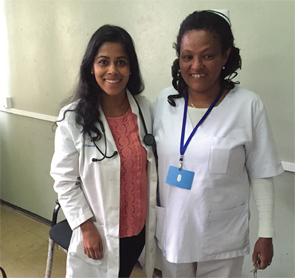
Dr. Abraham (pink shirt) with Nurse Wubitu (head nurse of the Black Lion rheumatology clinic) following her
going-away party.
During our brief one-month stay, we were able to inspire a couple of residents to consider fellowship in rheumatology through the help of the International League of Associations for Rheumatology. Such efforts need to be reinforced in order to create a sustainable supply of rheumatology professionals to meet the rheumatologic needs of Ethiopian patients. However, it is also important to address the lack of supplies to do rheumatologic procedures.
Headed Home Again
My month in Ethiopia challenged me to manage rheumatic diseases in a low-resource setting while delivering cost-effective care. I learned to deliver patient care with minimal labs or other resources, a lesson that is invaluable while I practice in this era when physicians are challenged to deliver cost-effective quality care.
We were well received at Black Lion Hospital and received excellent feedback. I truly believe my colleagues and patients at Black Lion Hospital taught me more than I taught them. Ethiopian people, my patients, were kind and generous, and allowed me to learn from them—not just how to be a doctor but also how to be a human being. We hope to eventually establish a rheumatology fellowship at Black Lion Hospital and continue to inspire future doctors to pursue rheumatology.
I boarded my return flight knowing how lucky I was to have this experience in Ethiopia; it was nothing short of remarkable and could not have been possible without my colleagues and patients at Black Lion.
Mary Abraham, MD, MBA, is a second-year rheumatology fellow at Emory University, Atlanta.
Frehyiwot Ayele, MD, is assistant professor of rheumatology at Emory University, Atlanta.
